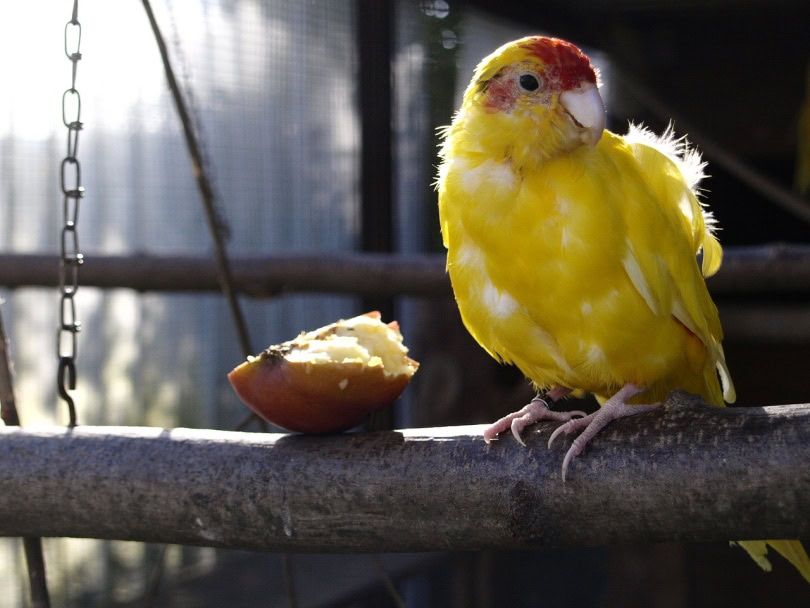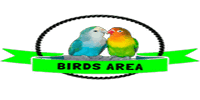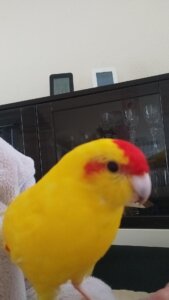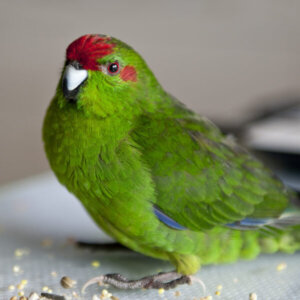Can Kakarikis Eat Pears? A Complete Guide for Bird Owners
Yes, Kakarikis can eat pears. Pears are safe and nutritious for them.
These birds enjoy the sweet taste and soft texture. Kakarikis, also known as New Zealand parakeets, have diverse dietary needs. Feeding them a variety of fruits, including pears, ensures balanced nutrition. Pears offer vitamins and minerals essential for their health.
Always wash the fruit well and remove seeds before serving. The seeds can be harmful if ingested. A balanced diet keeps Kakarikis active and healthy. Including pears occasionally can add variety to their meals. This article explores the benefits of feeding pears to Kakarikis. It also provides tips on how to serve this fruit safely. Continue reading to learn more about the dietary needs of these colorful birds.

Credit: pangovet.com
Introduction To Kakarikis
Kakarikis are small, vibrant parrots native to New Zealand. They are known for their playful nature and distinctive calls. These birds are popular pets due to their friendly and curious demeanor. Kakarikis need a balanced diet to stay healthy. Knowing what they can eat is crucial for their well-being.
Origin And Characteristics
Kakarikis come from New Zealand. They are also called New Zealand parakeets. They are small, about 10 inches long. Their feathers are bright green, with some having red or yellow markings. Kakarikis are very active and love to explore. They are social birds and enjoy interacting with their owners.
Dietary Needs
Kakarikis need a varied diet. They eat seeds, fruits, and vegetables. Fresh water should always be available. A well-rounded diet helps them stay healthy.
| Food Type | Examples |
|---|---|
| Seeds | Millet, sunflower seeds |
| Fruits | Apples, pears, grapes |
| Vegetables | Carrots, spinach, broccoli |
Can Kakarikis eat pears? Yes, they can. Pears are safe and healthy for Kakarikis. They should be washed and cut into small pieces. Remove any seeds before feeding pears to your Kakariki. Pears provide vitamins and hydration. They are a good addition to their diet.
Nutritional Benefits Of Pears
Pears provide essential vitamins and minerals beneficial for Kakarikis. They are rich in fiber, aiding digestion. Pears also contain antioxidants, supporting overall bird health.
Pears are not only delicious but also packed with essential nutrients. They can be a great addition to a Kakariki’s diet. Let’s explore the nutritional benefits of pears for these vibrant birds.Vitamins And Minerals
Pears are rich in vitamins such as Vitamin C and Vitamin K. Vitamin C boosts the immune system of Kakarikis. It helps them fight off infections. Vitamin K plays a crucial role in blood clotting. It ensures that the bird’s wounds heal properly. Pears also contain important minerals like potassium and copper. Potassium helps in muscle function, while copper aids in red blood cell production.Fiber And Hydration
Pears are an excellent source of dietary fiber. Fiber aids in digestion and keeps the Kakariki’s gut healthy. It prevents constipation and ensures smooth bowel movements. Pears also have high water content. This helps in keeping the bird hydrated. Proper hydration is essential for overall health. It ensures the bird’s organs function well. Pears provide essential nutrients that can benefit Kakarikis in many ways. They support the bird’s immune system, digestion, and hydration. Always ensure pears are fresh and clean before feeding them to your Kakariki. “`Safety Of Pears For Kakarikis
Pears can be a safe treat for Kakarikis when given in moderation. They offer vitamins and hydration. Always remove seeds first.
Pears are a tasty and nutritious fruit enjoyed by many. But can Kakarikis, a type of parrot, eat pears safely? It’s essential to know the safety of pears for these lively birds. This section covers toxicity concerns and appropriate serving sizes for Kakarikis.Toxicity Concerns
Pears are generally safe for Kakarikis. They do not contain harmful substances that can poison these birds. But, always remove the seeds and core. Pear seeds contain small amounts of cyanide. This can be harmful to birds if consumed in large quantities.Appropriate Serving Sizes
Offer pears in moderation. Small, bite-sized pieces work best. Too much fruit can cause digestive issues. A few pieces, given a few times a week, are enough. Balance their diet with other fruits, vegetables, and bird pellets. Always wash the pear thoroughly before serving. This removes any pesticides or chemicals that might be present. “`How To Prepare Pears For Kakarikis
Kakarikis can eat pears safely. Remove seeds and cut the pear into small, bite-sized pieces. Wash thoroughly to remove pesticides.
Pears are a delicious and nutritious treat for Kakarikis. It’s important to prepare them properly for your feathered friends. Here are some steps to ensure pears are safe and enjoyable for your Kakarikis.Washing And Peeling
Always start by washing the pears thoroughly. This removes any pesticides or dirt. Use cold water and gently rub the skin. Peeling the pears is also important. The skin might be tough for Kakarikis to digest. Use a vegetable peeler or a knife to remove the skin.Cutting Into Safe Sizes
After washing and peeling, cut the pear into small pieces. Make sure the pieces are small enough to prevent choking. Remove the seeds and core. These parts are not safe for Kakarikis. Once cut into safe sizes, you can offer the pear pieces to your Kakarikis. Watch them enjoy this healthy treat! “`Introducing Pears To Your Kakariki
Introducing pears to your Kakariki can be a delightful experience. Pears are nutritious and can make a great treat for your feathered friend. Before serving, wash the pear thoroughly. Remove any seeds as they can be harmful. Start with small pieces to see how your Kakariki reacts.
Initial Reactions
Observe your Kakariki’s initial reactions when you introduce pears. Some birds may be curious and try the new treat immediately. Others might need some encouragement. Place the pear pieces in their food dish and watch their behavior.
Positive reactions include nibbling, pecking, and eating the pear with enthusiasm. If your bird shows disinterest, don’t worry. Sometimes, it takes a few tries for them to accept new foods. Offer pear pieces again in a few days.
Monitoring For Allergies
It’s crucial to monitor your Kakariki for any signs of allergies. Symptoms might include swelling, difficulty breathing, or unusual behavior. If you notice any of these signs, remove the pears immediately and consult a veterinarian.
Keep a close eye on your bird after introducing any new food. Document any changes in their behavior or health. Regular monitoring ensures your Kakariki stays healthy and enjoys a balanced diet.

Credit: www.northernparrots.com
Alternatives To Pears
While pears are a nutritious treat for Kakarikis, variety is key to a balanced diet. Offering alternatives ensures they get a wide range of nutrients. Below are some safe fruit options that can be a great substitute for pears.
Other Safe Fruits
Many fruits are safe and healthy for Kakarikis. Apples, with seeds removed, are a great choice. They are rich in vitamins and minerals. Bananas are another safe option. They provide essential potassium and are easy to eat. Blueberries are small and packed with antioxidants. Strawberries offer a sweet treat full of vitamin C. These fruits not only add variety but also keep your bird healthy and happy.
Seasonal Fruit Options
Seasonal fruits are fresh and often more nutritious. In summer, watermelon can be a hydrating snack. It is mostly water and easy to digest. During fall, pumpkins can be a fun and healthy treat. They are full of fiber and vitamins. Winter brings citrus fruits like oranges. These are full of vitamin C and great for boosting immunity. Springtime offers a variety of berries, which are rich in antioxidants. Offering seasonal fruits ensures your Kakariki enjoys fresh and diverse meals throughout the year.
Potential Health Issues
Pears can be a tasty treat for your Kakariki. However, they may cause potential health issues. Understanding these risks helps ensure your pet bird stays healthy. Here, we explore some common concerns.
Overfeeding Risks
Overfeeding pears to Kakarikis can lead to obesity. Pears contain natural sugars. Too much sugar can cause weight gain. This can affect the bird’s mobility. It can also strain its heart and other organs.
Balance is key. Offer pears in moderation. A balanced diet includes fruits, vegetables, seeds, and pellets. This ensures your bird gets all the nutrients it needs.
Signs Of Digestive Problems
Digestive issues can arise from eating too many pears. Watch for changes in your Kakariki’s droppings. Loose or watery droppings may indicate diarrhea. A swollen abdomen can signal bloating.
Monitor your bird’s behavior. Lethargy or a lack of appetite are warning signs. If you notice any of these symptoms, consult a vet. Early intervention can prevent more serious health issues.
Tips For A Balanced Diet
Kakarikis can enjoy pears as part of a balanced diet. Pears provide vitamins and hydration. Serve in small, manageable pieces.
Providing a balanced diet is crucial for the well-being of your Kakariki. A good mix of fruits, vegetables, seeds, and pellets helps keep them healthy. Pears can be part of this diet, but balance is key.Combining Fruits And Vegetables
Offer a variety of fruits and vegetables. Mix pears with carrots, apples, and spinach. This provides essential vitamins. Avoid giving too much of one type. Balance is vital. Too many pears can cause digestive issues. Small portions work best.Regular Feeding Schedule
Feed your Kakariki at the same time each day. Consistency helps their digestion. Divide their food into two meals. Morning and evening work well. Keep their feeding area clean. Fresh water is also important. Replace it daily. “`
Credit: www.northernparrots.com
Frequently Asked Questions
Are Pears Safe For Kakarikis?
Yes, pears are safe for Kakarikis. They are a healthy treat when given in moderation.
How Should I Prepare Pears For Kakarikis?
Wash the pear thoroughly, remove seeds, and cut it into small, manageable pieces.
Can Kakarikis Eat Pear Seeds?
No, pear seeds contain cyanogenic compounds and should be removed before feeding pears to Kakarikis.
How Often Can Kakarikis Eat Pears?
Offer pears to your Kakariki occasionally as a treat, not more than once or twice a week.
Conclusion
Pears can be a healthy treat for your Kakariki. They offer vitamins and hydration. Always give pears in moderation. Remove seeds and core before serving. Watch for any allergic reactions. Your Kakariki’s diet should be varied. Include other fruits and vegetables.
This ensures balanced nutrition. Consult your vet for personalized advice. Enjoy feeding your feathered friend safely!
Hello Dear, I'm Poli Kolymnia, owner of many birds (including budgies).
With a deep passion for these feathered companions, I'm here to share my expertise and extensive knowledge on birds care.
My articles cover essential topics like diet, housing, care, and health, providing practical tips to help you create a happy and thriving environment for your birds.






